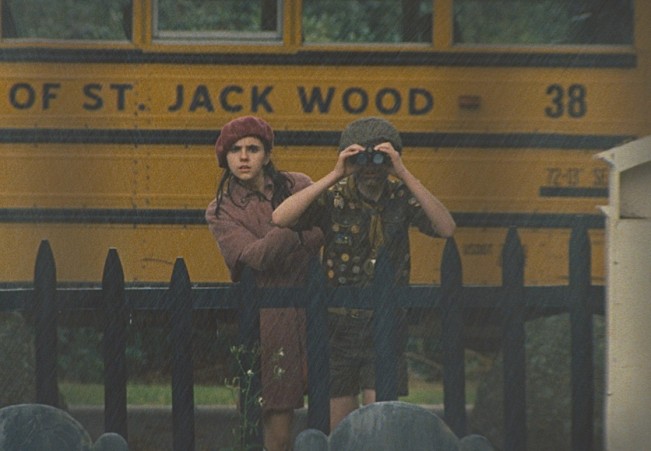By Jake Howell jake.howell@utoronto.ca
Cannes Competition Review: Moonrise Kingdom
WES ANDERSON’S LATEST FEATURE is a charming, albeit slightly rushed 1960s update to the Romeo and Juliet story. Fans of Anderson’s work will find everything in Moonrise Kingdom that they love about the director, as well as an evolution of his style.
Likely the most salient aesthetic of any Wes Anderson film is his love for pastel colors and the insistence of symmetrical beauty, and I’m happy to report that Moonrise Kingdom is recognizably a continuation of these artistic decisions. Every scene is delicately balanced on both sides of the frame, granting the audience a chance to take in each shot as they would a piece of art in a gallery. Also interesting is Moonrise Kingdom’s liberal usage of dolly tracking shots, which allow Anderson’s camera to tiptoe quietly through his painstakingly-arranged sets. The camera stops in regular intervals to give viewers a chance to relish another tableau, which is always a joy to look at. The effect is nothing less than painterly, and should be the new standard in Anderson’s direction.
Moonrise Kingdom’s romance isn’t exactly unique, as audiences have been subjected to narratives of forbidden love for centuries. Thankfully, Anderson’s eccentric cast of characters and meticulous attention to detail sets his newest film apart from other iterations of the classic story. In Shakespearian terms, our Romeo is Sam Shakusky (Jared Gilman), a glasses-askew boy scout with record levels of awkward; while the odd and lonely Suzy Bishop (Kara Hayward) plays Juliet. The curiously-dressed narrator (Bob Balaban) is the Greek chorus—he describes the weather, the New England setting, the year—but most importantly, he outlines the impending storm that is soon to befall the players, eventually becoming the catalyst for the film’s conclusion. After befriending each other as pen pals, the two agree to elope together, with destiny dictating their love. Aww.
Cynics be damned: the scenes between Sam and Suzy are really quite lovely, and audiences will find themselves falling in love with the nostalgia of youthful naïveté. There is a general sense of envy while viewing Moonrise Kingdom, as the only thing these crazy kids want is adventure and the freedom to love each other. If only life was so simple! It may come across as a fluffy little fantasy that is trying too hard to be cute, but it nevertheless succeeds. You have to hand it to Anderson, because Moonrise Kingdom is genuinely charming.
Unfortunately, the patience of Anderson’s masterful choreography begins to fall to the wayside near the end of the film, where the framing becomes hurried and the action frantic. As a result, Moonrise Kingdom’s final act is formally very different from the tracking shots and calculated juxtapositions of the earlier two thirds, which is a shame, given the excellent postcard beauty found before things get crazy. The same occurs on a narrative level, with the conclusion happening far too quickly; as if Anderson desperately wanted to finish shooting and begin the post-production process. This is a stark contrast from the stop-and-smell-the-flowers approach to the rest of the film, but is still overall tolerable. Rarely is a feature film too short, but Moonrise Kingdom is a prime candidate for extension. Perhaps the DVD release will hold a director’s cut?
While it’s important to mention the star-studded ensemble of Bruce Willis, Bill Murray, Tilda Swinton, Edward Norton, and Frances McDormand, they actually come across as a jarring reversion to reality, and feel altogether secondary to the enjoyment of this film. They each have their own one-liners (plus, there are some humorous cameos from the legion of Anderson collaborators), but the fantasy of Sam and Suzy’s escape is so absorbing that you don’t really want it to end. Sadly, when it does, the film becomes less enjoyable, because these adults are the killjoys of Moonrise Kingdom’s little dream world. This isn’t due to the A-list talent slacking in their performances (they aren’t), but rather a result of the nature of the beast: what goes up must also come down.
Make no mistake—the true stars of this film are Jared Gilman and Kara Hayward, and should be seen because of them. These newcomers are very talented and extremely photogenic (Hayward in particular looks strikingly like a younger Emma Watson), and hopefully Moonrise Kingdom’s trajectory bestows upon these kids a brilliant acting career.

















